
Why was it a problem that Trump had top secret nuclear documents in his home (besides, of course, being completely illegal)?
Because it directly undermined a key pillar of US foreign policy since 1945: nonproliferation.
[THREAD]
Because it directly undermined a key pillar of US foreign policy since 1945: nonproliferation.
[THREAD]

You really can't understand US foreign policy since 1945 if you don't consider two key facts:
(1) That the United States first developed the atomic bomb in 1945 (through the Manhattan Project)

(1) That the United States first developed the atomic bomb in 1945 (through the Manhattan Project)


Since that time, US foreign policy has gone through three phases, all focused on stopping the spread of nuclear technology:
- Phase 1: PRESERVING
- Phase 2: PREVENTING
- Phase 3: PROHIBITING
- Phase 1: PRESERVING
- Phase 2: PREVENTING
- Phase 3: PROHIBITING
Phase 1: PRESERVING
Up to 1949, the United States held a nuclear monopoly: it was the only country with a nuclear weapon.
Up to 1949, the United States held a nuclear monopoly: it was the only country with a nuclear weapon.
A key part of US policy during that time was to maintain that monopoly (which really started during World War II).
academic.oup.com/ahr/article-ab…
academic.oup.com/ahr/article-ab…
A good example of that effort was the "Baruch Plan", whereby the United States, through the UN, would proposed to assist other countries in developing nuclear energy (but not weapons).
onlinelibrary.wiley.com/doi/abs/10.111…
onlinelibrary.wiley.com/doi/abs/10.111…
PHASE 2: PREVENTING
After the Soviets broke the US monopoly, the focus of US policy shifted to controlling the spread of nuclear technology.
After the Soviets broke the US monopoly, the focus of US policy shifted to controlling the spread of nuclear technology.
This meant that nuclear proliferation could happen, but it had to happen on US terms.
For instance, the US would prevent some allies from acquiring the bomb...
amazon.com/Atomic-Assuran…
For instance, the US would prevent some allies from acquiring the bomb...
amazon.com/Atomic-Assuran…
Though President Eisenhower called for more international legal restrictions on the acquisition and development of the nuclear weapons... 

...those efforts wouldn't start in earnest until after the "nuclear war near-miss" that was the Cuban Missile Crisis of 1962. 

PHASE 3: PROHIBITING
Starting in the 1960s, the focus was on creating and enforcing international legal restrictions on the spread of nuclear technology.
Starting in the 1960s, the focus was on creating and enforcing international legal restrictions on the spread of nuclear technology.
For example, US-Soviet cooperation led to the creation of the Nuclear Non-proliferation Treaty in 1968.
journals.uchicago.edu/doi/abs/10.108…
journals.uchicago.edu/doi/abs/10.108…
After that, a pillar of the US-led "rules-based order" was enforcing that legal prohibition on the development of nuclear weapons.
unidir.org/commentary/int…
unidir.org/commentary/int…
This entailed stopping other countries from acquiring the bomb -- calling them "outlaw" countries or "rogue states" or just "evil".
nytimes.com/video/us/polit…
nytimes.com/video/us/polit…
It also meant negotiating arms control treaties with existing nuclear powers...
amazon.com/dp/B094DRDCWD/…
amazon.com/dp/B094DRDCWD/…
...and, such as during the 1990s, working with Russia to remove nuclear weapons from other countries.
en.wikipedia.org/wiki/Budapest_…
en.wikipedia.org/wiki/Budapest_…
Okay, so why is this relevant to Trump and the classified documents he possessed?
washingtonpost.com/national-secur…
washingtonpost.com/national-secur…
It's widely recognized that the US tends to "overclassify" documentation regarding nuclear weapons.
https://twitter.com/ArmsControlWonk/status/1558032245058928641
But overclassification makes sense if one recognizes that US post-1945 foreign policy is focused on stopping the spread of nuclear weapons technology.
The concern is that such documents could be used to help another state acquire the bomb. After all, it's not unusual for people to try to sell US nuclear secrets.
bbc.com/news/world-us-…
bbc.com/news/world-us-…
In short, Trump possessing those documents was a problem because they directly threatened a key component of US foreign policy since 1945.
Oh, and because mishandling classified info -- regardless of the content -- is illegal.
[END]
Oh, and because mishandling classified info -- regardless of the content -- is illegal.
[END]
• • •
Missing some Tweet in this thread? You can try to
force a refresh











